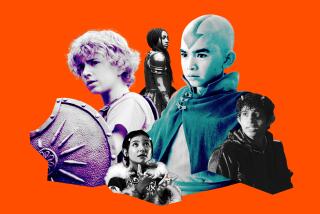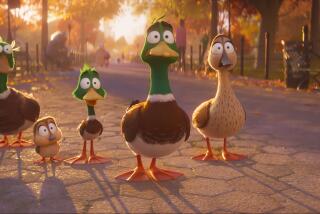Review: While far from vital, ‘Aladdin’ isn’t the disastrous Disney-Will Smith remake you feared
- Share via
“It’s clumsy, but in a charming way,” a palace servant declares about halfway through “Aladdin,” and I’m inclined to agree. The servant, whose name is Dalia (Nasim Pedrad), is describing the sweet overtures of a man (Will Smith) she does not yet realize is a powerful genie. But she could also be talking about the movie she’s in, which is all kinds of flat-footed yet wrings more high-spirited merriment than you’d expect from what is essentially a lavish exercise in cinematic refurbishment.
In that latter respect, of course, “Aladdin” is hardly alone. It’s the latest of Disney’s wildly uneven attempts to translate the magic of its best-loved animated classics into a heavily digitized live-action idiom. The results, which include this year’s fascinatingly misguided Tim Burton revamp of “Dumbo,” haven’t been much to write home about lately. Even when the approach pays off — and I admit to some qualified admiration for “Cinderella” and “The Jungle Book” — the pleasurable rush of nostalgia is often accompanied by a sense of bewilderment verging on betrayal.
Disney’s shareholders aside (and even that’s questionable), who really wants, much less needs, these movies? What audience is served by their busy, chintzy visuals and inferior reproductions of moments that already exist, unimprovably, in our pop-cultural memory?
“Aladdin,” directed with slick anonymity by Guy Ritchie from a script by John August, doesn’t answer these questions so much as it slyly disarms them. No one really needs this mostly middling, fitfully funny and never unpleasant movie. And the movie itself seems cheerfully aware of that fact as it deftly lifts lines, beats, characters and songs from its 1992 predecessor, every so often punching up the comedy, wrinkling the plot and injecting a dash of politically corrective subtext.
ALSO: With new versions of ‘Aladdin’ and ‘The Lion King,’ Disney straddles nostalgia and novelty »
It helps that the original, an effortlessly entertaining addition to Disney’s mid-’90s renaissance, has never been a sacrosanct cultural object on the level of, say, “Beauty and the Beast.” (This may explain why that picture’s 2017 remake felt so dismal by comparison.) Aladdin, never the most compelling of heroes, gets a handsome, serviceable new avatar here in the form of Mena Massoud. He’s not a diamond in the rough exactly, but he suits a movie whose aesthetic is pure cubic zirconium.
The music, at least, is as good as ever. A few tweaks aside — most noticeably in “Arabian Nights,” which already underwent some infamous damage control 27 years ago — the infectious songs of Alan Menken, Howard Ashman and Tim Rice have been left happily intact. As for the desert kingdom of Agrabah, it has become a glittering cornucopia of Arab cultural signifiers, overflowing with confetti and flowers, jewels and spices.
The city’s casbah is still a paradise for parkour fiends, with the wily pickpocket Aladdin performing so much jumping and flipping from one rooftop to the next, you may wonder if Massoud did his own Agrabahtics. Still, all the street smarts in the world can’t keep Aladdin and his pet monkey, Abu, from entering the Cave of Wonders to retrieve a mysterious brass lamp at the behest of the treacherous sorcerer Jafar (Marwan Kenzari).
You know the rest: After some lava-spewing sub-“Indiana Jones” pyrotechnics and a little rub-a-dub-dub, Smith’s Genie bursts forth from the lamp, ready to grant his new master three wishes. His dazzling sleight-of-hand illusions, with which he disguises Aladdin as a prince from a faraway land and a possible suitor for the hand of Princess Jasmine (Naomi Scott), give the picture a comic lift and also throw some of its pleasures into relief. This “Aladdin” may deal proudly and unapologetically in secondhand wares, but it’s worth remembering that even borrowed magic has its uses.
The Genie, of course, was the original movie’s manically entertaining raison d’être, and he was also the source of much of the early concern swirling around the remake. It was clear that no one could match the gale-force comic impact of Robin Williams, whose dazzling bursts of vaudevillian lunacy and his ability to shift from one goofy persona to the next were ideally suited to the speed and dexterity of hand-drawn animation. Finally, here was a medium that could keep pace with him.
Live action is in some ways a slower, more cumbersome medium, which suits Smith just fine, his own moments of song-and-dance lunacy being neither as frequent nor as inspired. When he sings “You ain’t never had a friend like me,” it’s hard not to recall Williams’ much more elaborate version of the number and smile at the irony. But Smith’s interpretation has its sneaky pleasures. He makes a less quippy and in some ways pricklier Genie, less inclined to coddle Aladdin and more prone to doling out the kind of romantic advice that might remind you of the professional love guru Smith played in “Hitch.”
“But — but he’s blue!” you might protest, perhaps having seen the ghastly looking early stills. Well, yes, he is, though not all the time, fortunately, as the plot requires the Genie to blend in and pass himself off as Aladdin’s manservant. The occasional sight of him in jolly-blue-giant mode, with all manner of gold jewelry adorning his bulging cerulean torso, offers a brief, welcome jolt of the grotesque. Fantasy can be a vehicle for wonderment, yes, but weirdness too.
The rest of “Aladdin” cleaves to more straightforward lines, even as it tries to give the supporting characters greater complexity and political awareness to match their flesh-and-blood makeovers. Jasmine now has ambitions to defy the patriarchal order and succeed her father (Navid Negahban) as sultan, as she declares in the film’s lone new song — a courtyard power ballad that Scott delivers with show-stopping conviction. It’s a rousing display of storming-the-gates feminism, if also by now a somewhat perfunctory, performative one.
A genuinely bold notion of progress might have put the magic lamp in Jasmine’s hands for at least a spell. But instead it falls again to Jafar, moderately reconceived as an ambitious former “street rat” himself who wants to transform Agrabah into a conquering empire. For all that, he is a touch less sinister and more human — and, as played by Kenzari, considerably more attractive — than his hook-nosed cartoon counterpart.
Glowering villains and comically exaggerated facial features have of course always been staples of Disney animation, though not every such film has taken it upon itself to depict a culture so often demonized and misrepresented in popular entertainment. In the case of this live-action “Aladdin,” you sense that extra care and sensitivity has been taken to avoid the usual menacing-Arab clichés, even at the risk of replacing a few nasty, snarling stereotypes with happy, upbeat ones.
The upgrades here are primarily cosmetic, which is no reason to discount their pleasures. There’s an infectiously entertaining dance number in which the Genie manipulates Aladdin’s body like a marionette, allowing Massoud to show off some deft physical slapstick. Some of the original comedy bits are genuinely winsome, Pedrad’s sly and sardonic performance as Jasmine’s servant Dalia included.
As for the central romance, the filmmakers know to leave well enough alone and let happily-ever-after take its course. When Aladdin takes Jasmine out for a spin on his magic carpet, you’re reminded that “A Whole New World” never gets, well, old.
------------
‘Aladdin’
Rated: PG, for some action/peril
Running time: 2 hours, 8 minutes
Playing: Opens Friday in general release
[email protected] | Twitter: @JustinCChang
More to Read
Only good movies
Get the Indie Focus newsletter, Mark Olsen's weekly guide to the world of cinema.
You may occasionally receive promotional content from the Los Angeles Times.











